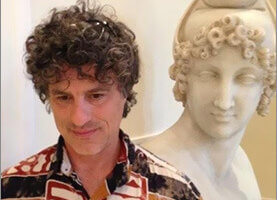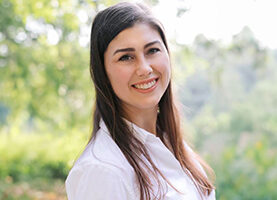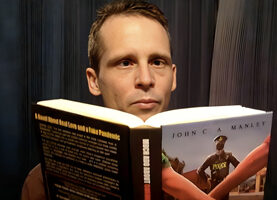
Support Us
Donations will be tax deductible
Creon Levit, Director R&D, Planet Labs, provides an interesting overview of the advanced satellites that are being launched to help us better understand and monitor our planet.
Levit is a seasoned scientific expert. As an award-winning research scientist of the NASA Ames Research Center in Silicon Valley for 33 years, he was a leader and manager of many advanced projects that combined new techniques in scientific computing, machine learning, and complex graphics, to find solutions for crucial NASA problems.
Levit discusses his background and his current mission at Planet Labs, where they build, launch, and operate the world’s largest constellation of satellites to make changes on Earth more visible and actionable. As he states, Planet Labs has launched over 300 satellites to date, though approximately only half of those are still in orbit currently. Many that were simply launched for testing have now re-entered the atmosphere and burned up.
Levit explains their high-resolution satellites, discussing what they image and how they gather data. The research scientist talks about medium resolution satellites that image the Earth in visible, and near-infrared colors. He explains their resolution and quality level. Levit discusses their data set in regard to climate change, and he expounds upon their data that many environmental researchers access to further studies in multiple areas, such as climate, ice flow, species diversity, land use, and much more.
The Planet Labs scientific expert provides an overview of some, particularly interesting use cases. He describes one specific use of their daily data that delivers valuable information to ranchers, informing them about the optimum stage of grass development for ruminate animals to graze. By utilizing this data, ranchers can manage grass health and animal health simultaneously.
Additionally, Levit talks about the value of infrared and the many amazing things it can help researchers learn and differentiate. He explains spectral bands and elaborates on the detection of gases, specifically the tracking of environmentally-relevant gases.
Richard Jacobs: Hello. This is Richard Jacobs with the future tech podcast. My guest today is Creon Levit. He’s the director of R&D at Planet Labs. He worked for 32 years at NASA Ames Research Center in Silicon Valley, now the Director of Research at Planet Labs where they build, launch and operate the world’s largest constellation of satellites to make the change on earth more visible and actionable. So we’ll get into what that means. But Creon, thanks for coming.
Creon Levit: Oh my pleasure. And I’ve been looking forward to this.
Richard Jacobs: Yeah. So how many satellites have been launched by a light planet and are they in, you know, what kind of orbit in? Like what are a few details of the constellation?
Creon Levit: Well, that’s a bit of a complicated story, but basically planet has launched well over 300 satellites, although we do not have that many in orbit right now. We have, I think around half that many in orbit right now. A number of them have launched a few years ago into very low orbits. They were just for testing. And so they have reentered the atmosphere and burned up. But we have actually sort of a Meta constellation up there now built with multiple sub constellations. I could pull up the exact numbers if I need to, but we have about 150 small micro sets up their cube sets but they’re quite powerful. And then we have another constellation of larger satellites of similar power. And then we have also the world’s largest constellation of high-resolution imaging satellites. We have 15 Sky sat satellites that we got when we acquired the company Terabella from Google. We merged our two companies and they had a fleet of five high-resolution satellites in orbit. And since then we’ve launched 10 more. So these are all earth observation satellites, but they kind of run at different resolutions and different cadences. So the high-resolution satellites that are in lower, they’re all in low earth orbit, various altitudes from say 350 to 450 kilometers. And the high-resolution satellites image various targets on the ground, sort of by pointing at the thousands of targets per day. And then the lower resolution satellites, which are in greater numbers, the smaller ones, the image all of the land areas of the planet every day and coastal waters and islands and things like that. So we’d like to say we will plan it every day, but it’s actually the dayside of the planet. And it’s mostly land and coastlines.
Richard Jacobs: So when you say different resolutions, like what is the highest resolution that you have? You know, are there higher resolutions satellites out there that are like government satellites that are secrets or what can you say about resolution?
Creon Levit: Well, I can’t say anything about government secrets of course. We talk about our medium resolution satellites and our high-resolution satellites and our medium resolution satellites image the earth at around five meters per pixel and in multiple spectral bands, four, five or eight spectral bands depending on how new they are. So each pixel is roughly five meters square on the ground and gets imaged in a bunch of visible and as well as in near-infrared colors. And then the high-resolution satellites, they have a resolution of about 80 centimeters per pixel. So, let’s see, that’s about around three feet. And there are higher resolution imaging satellites in orbit even once that is unclassified. There’s a one in particular named worldview three that can image at 35 centimeters per pixel. It’s like a billion-dollar satellite and the US government buys a lot of that imagery, but other people do as well. But we have 15 satellites in orbit that can image at a little less than half of that high-resolution worldview. As for the top-secret government stuff, we could just assume that they are at least as good as the worldview 35-centimeter resolution and perhaps better. In fact, almost certainly better.
Richard Jacobs: You think anyone’s got the technology out there to do like a, you know, one inch or one-centimeter resolution per pixel?
Creon Levit: No, that’s pretty much prohibited by the laws of physics. Things like atmospheric turbulence and atmospheric scattering and just the wave nature of light means that can’t be done or probably can’t be done.
Richard Jacobs: And what do you think the wall is, the threshold, the limit for visible light?
Creon Levit: As I understand it, the threshold is probably around maybe six inches on a good day, unlike on a perfect day with still cool air and just the right lighting and everything in perfect working precision on your satellite, then you might be able to get a six-inch resolution. But oftentimes not like everything that happens just conspires to mess it up. Right. If the air is turbulent or if there’s any Hayes or clouds or smoke or if there’s anything out of adjustment on your satellite, you know, it always gets blurrier. It never gets sharper.
Richard Jacobs: Yeah. So the images you guys are looking every day at land masses and water and why look at things every day? Are there very much changed day to day and things, you know, what do you see that’s interesting that happens on a day to day change basis?
Creon Levit: Well, of course, that depends on what special scale we’re looking for. If we’re looking at high resolution, you know, we tend to be looking at areas where there’s a lot of human activity and that changes on a day to day basis. You know, a business activity changes on weekly and have seasonal cycles. And we can see that to some extent by looking at all kinds of indicators of business activity, industrial activity as well. Similarly changes, you know, you can see if mines are running or not and if power plants are running or not and if ports are busy or not and how many ships are coming and going. You on the medium resolution side that is more like agricultural situations. So we can tell the health of crops and we can tell the state of forests and we can tell kind of land use and we can see construction, projects going on. And so that stuff, you know, larger-scale stuff does change tend to change a little more slowly, right, or usually, unless there’s some giant forest fires or something and that might make it seem like, well, why bother imaging every day if, if stuff doesn’t change every day at that scale. But one thing to remember is that half the time on average, it’s cloudy and you don’t see anything in any given location. And some places are cloudy a lot more than half the time. So even if you look every day, once you might only get a clear shot every week.
Richard Jacobs: What about climate change? Are you able to see evidence of it or no evidence of it? Nice movements?
Creon Levit: Absolutely. Actually, because of the orbits of our satellites, we tend to image the Polar Regions more frequently than we image the rest of the earth. So when I say we image it every day, that’s just near the equator where we have this sort of spar cyst coverage. All the orbits kind of converged near the poles of all of our satellites. So we get higher coverage in the Polar Regions and we have special exposure settings for imaging the highly reflective ice and snow at the polls. And so we see all kinds of evidence of the ice moving and the ice changing and daily, seasonally as far evidence of climate change. You know, we’ve only been up there for a couple of years, so it’s hard to say from our dataset alone, what it says about climate change, one has to generally go back to the more long-term a lower resolution government data sets from like the Landsat satellites and things like that, so that you can look at, you know, 20, 30 years’ worth of data for high precision data for climate studies. But we see all kinds of environment. We have many users in the government and environmental organizations and other governments and scientists and university students, they all have access to our data or can obtain it. We have site-wide licenses for universities and things like that. And so people do all kinds of studies on climate and ice flow and species diversity and land use. So yeah, there’s a lot of environmental uses for these data.
Richard Jacobs: Yeah, that’s what I was going to say is who uses the data and why? In your opinion, what are some of the most useful things that have come from the data?
Creon Levit: Well, there are really, I would say three broad classes of data use and one might be called a, well let’s say, four classes. There’s obviously, you know, government and intelligence kind of use cases for remote sensing data. And then there is, there are commercial use cases such as we are = talking about before, like business activity and agricultural activity and predictions of future crop harvests. And you know, ways to tell farmers, you know, what fields need, what kind of treatment and how they’re doing. So there’s government stuff, there’s kind of agricultural commercial stuff including insurance. And then there are environmental use cases including human rights use cases where we can, you know, we have several situations where we’ve seen evidence of human rights violations or military activity that governments have denied and yet we’re clearly visible and hence they were accountable and they had to be more transparent. And then that kind of overlaps into scientific use cases, right? Whereas I said, climate, just studies of, ecology, geology, all sorts of things. So there’s a lot of different use cases and a lot of different customers. We have a growing set of customers. The market’s expanding as people figure out and how this data can be useful.
Richard Jacobs: Interesting. Where is the technology going? A couple of questions in here. How much data is generated from the images you’re producing and are you able to get everything you want out of the data, out of the images or do you need like a large scale processing of it? Because there is so much, you know, what’s to be said there?
Creon Levit: Well that’s a really good question. And it’s a rather deep question. So in terms of the raw amount of data, we download I believe around seven terabytes a day of image data from our satellite constellations. And we are actually, I believe required by law to maintain copies in perpetuity of all the data we download. And then that raw data is not necessarily very suitable even for looking at cause there’s all kinds of calibrations that have to be applied to it and it has to be sort of mapped onto the surface of the earth so that people know exactly can find it and know that it’s accurately registered and so that you can look at stacks of data over time. Cause that’s a big application. But obviously, no one’s going to be looking at seven terabytes of image data a day. Or even if they’re looking at just one spot, you know, we’re shooting it every day. And so the amount of image data is kind of overwhelming for all but the smallest regions of interest. And so the processing is kind of where the action is now. Like the question is how do you turn a bunch of images or stack of images or a huge map of images into something actionable. And so that really depends on the user’s applications and some users do it themselves and sometimes we provide the basics in an API format for them to image classification, object recognition, things like that on the data. So for instance, they could, you can look for all roads in a certain area and you can look for all roads that have been constructed in the last six months in a certain area, and then you can make a graph of how many there are and things like that’s just one application use case. But really you’re onto something there because most people seem convinced that the future of these massive data feeds are in, you know, image processing, machine learning, AI and transforming the image data into maybe simpler forms of data that people are actually interested in. Like how many houses were built or how many acres were burned, that sort of thing.
Richard Jacobs: Hmm. I guess probably the most interesting thing would be time-lapse. I guess if you took a series of images over the season and time-lapse them and then looked back one season, two season, three seasons, you know, like winter of this year, winter of last year, winter the year before, and compare the time-lapse them all three in a certain region to see if there were different manifestations of winter or different things.
Creon Levit: Hey, that’s a great idea. So, you can sign up for planet explorer, which is I guess kind of freemium browser we have when you can look through stacks of data and you can download them and you can process them. Right now we’re kind of moving more and more away from a download model and, more and more towards browse the data and then upload an algorithm and run it on our data in the cloud to produce the results you want. Because otherwise, as I met sort of alluded to before, it just ends up being a huge amount of data and a lot of processes, you know, a lot of data downloaded to a local machine and then a lot of processing or a lot of data trends worded somewhere else in the cloud for a lot of processing. So, we’re kind of moving a little more towards a, in place model. But all sorts of models are supported and everyone is encouraged to try and move on their own inspiration and see what they can do with it.
Richard Jacobs: Any surprising or really interesting use cases, the data and you thought were interesting to you?
Creon Levit: Oh gosh, there’s so many. I guess I’ll talk about that too that I’m personally pretty jazzed about. The first one is a commercial use case, but I believe it has really profound climate and environmental implications for the earth. And that is the use of the daily data to tell ranchers where the grass in their paddocks is at the perfect stage to send their ruminant animals out to graze. So if you want to keep the animals healthy and you want to keep the grass healthy and you want to keep the perennial grasses growing so their roots get deeper and deeper and they sequester more and more carbon and rebuild the soil and you have to send the animals out to graze at exactly the right time. If the grass is too short, it doesn’t work out for the grass or the animals or the soil. And if the grass is too long, the same situation. So, you have to know that the grass and the soil are at the optimal situation for the grazing and then you send your animals to that particular paddock. And I think that’s something which, there’s a company in New Zealand that’s been doing that with our data and now they’re scaling out to Africa. And I think that this is something that should be scaled worldwide and could really transform the planet and provide high-quality food in a carbon-negative manner. So that’s something I’m very excited about. And then to kind of switch gears. I would say another thing that I’m really excited about is a little more future-oriented and that is the tracking of species diversity in various regions, particularly rainforest. But it doesn’t have to be rainforest as we put more and more spectral bands into our medium resolution and high-resolution satellites. It becomes possible to really figure out to some extent which species are living in which pixels, of plants mostly, sometimes insects, I suppose. And so this is a pretty important thing and a big new field of science that’s going to become more and more important if we want to understand globally what’s going on with migration and climate change and natural processes as well as human perturbations.
Richard Jacobs: Yeah. I was going to ask you if you can tag, let’s say a flock of birds and then use satellites to watch its migrations or a herd of animals or other objects in it. Okay.
Creon Levit: By tag, what do you mean?
Richard Jacobs: Well, tag it in such a way that a satellite could pick it out even though it doesn’t have a, let’s say it only has a three-foot resolution.
Creon Levit: Well, yeah, I mean definitely, definitely. I believe that there’s a pretty big system of using radio tagging of animals. You know, they actually literally staple a tag onto the animal that’s got a radio transmitter and, you know, naturalists have been using that sort of thing and farmers too, of course. And I know that there are some satellite systems that can track those RF id kinds of tags from orbit. Ours. We don’t do that, at least not right now. And as for trying to track animals from orbit. Yeah. We’ve occasionally spotted Whales and I guess we could, should be able to see the sort of largest flamingo flocks and things like this. That’s a good question. I don’t really know what evidence of animals we’ve seen from orbit. Really large herds. Well, we’ve seen herds of cows, but I don’t really know of any great use cases on these. I think some farmer actually lined up all his cows into a funny message for one of our satellites.
Richard Jacobs: Must be pretty cool. And you mentioned the other spectrum visibly, I guess you do infrared, you do UV or like what spectrum do you use?
Creon Levit: Well we don’t really use UV because that’s all just scattered by the atmosphere. And so unless you’re just interested in high altitude clouds and aerosols, you can’t really see UV from the surface. As you know, the atmosphere blocks UV, which is why we don’t all get fried by the sun. Even blue light is pretty low information content in terms of what you can see of the ground. If you’re looking in the blue spectrum, you know, you look at the earth, from space, it looks like a big blue ball. So there’s not that much to see in the blue. I mean we image in blue but the red and the green or the really high information content, visible bands and then there’s a lot of infrared. Infrared is in a sense much broader and variety till then visible, visible is about one octave and infrared is several octaves. And that we routinely image in the near-infrared. We’ve sent some camera’s up to visit the image in shortwave infrared, which is a little bit more into the infrared. And then there’s medium wave infrared and long-wave infrared, which are kind of like thermal. And we’ve actually sent some thermal cameras up as well, but we don’t have any products that are short wave infrared or thermal infrared at this time. It’s not to say that we won’t have them in the future. We probably will, but other satellites image at those longer wavelengths, shortwave infrared, and medium wave infrared, long-wave infrared. But as you go to those deeper and deeper infrared wavelengths, a sort of, because of the laws of physics, the light, the wavelength of light gets longer and longer and hence the resolution gets worse and worse for a constant size telescope if you will. Like the thing which determines the resolution of a satellite, assuming you build it and operate it perfectly is how big the telescope is compared to the wavelength of light that you’re imaging. So given telescope, say like Sky sat constellation has 35-centimeter diameter telescopes, you know, they have one resolution in the blue end of the spectrum. And then in the near-infrared, they have like half that much resolution because the near-infrared light is like twice the wavelength of the blue light. So anyway, that’s a little technical, but the point is that as you go to the infrared, you either have to accept the lower resolution or build a larger more expensive satellite. And then, there are other problems as well with infrared. Like you have to start cooling the detectors or otherwise, you get too much noise. So it tends to get more expensive if you want high-quality infrared imagery, especially into the longer wavelengths, but you know, that’s probably going to get cheaper and it’s probably going to become more attractive for us to fly more of that stuff in the future.
Richard Jacobs: What information do you think will be gotten from exploring the infrared section?
Creon Levit: Oh, infrared can do magical things. Infrared can tell you about the moisture content of all kinds of organic material on the ground alive or dead. Infrared can help you differentiate, species as we were talking about before. And if you chop it up, fine enough, like if you have enough spectral bands in the infrared, like very narrow spectral bands, which of course is technically challenging but certainly doable with enough time and effort. If you have narrow spectral bands in the shortwave infrared, you can even detect gases of interest such as carbon dioxide, methane, water vapor and so you can track the mission and transport of environmentally relevant gases, whether they’re admitted by volcanoes or humans or the ecosphere anyway. So that’s pretty interesting. And that has a lot of potential applications. And also with the short wave infrared, you can determine certain things about the mineralogical content of the ground that you’re looking at. And that’s interesting, although that probably doesn’t change very quickly, so it’s not clear that you need regular updates on that.
Richard Jacobs: Okay. You mentioned a way for people to explore the images through their computer? Can you restate that again and I want to ask you for some more follow up until.
Creon Levit: Oh, yeah. Well, I think its planet.com/explorer. But if you just go to planet.com, I believe that it’ll point people to the explorer program. And also, you know, of course, we’re always looking for qualified engineers and all kinds of people, hardware, software, spacecraft, and domain experts. Yeah, I’d take just rather than me bundling some URL that I can’t quite remember. Just go to planet.com and look around for explorer and look around for all sorts of things. We have blogs and use cases and you can see some of the beautiful imagery.
Richard Jacobs: And the best way to get in touch and ask questions for follow up is also planets.com. Was there another way to do that?
Creon Levit: Well I mean, we can, I think that’s the best way for now and people can find my email address anyway online if they want to talk to me. So that’s pretty obvious. I’m willing to entertain questions as long as they don’t get overwhelmingly frequent.
Richard Jacobs: Sure. Okay. Well, that’s great Creon. I appreciate you coming on the podcast and it’s like super interesting to see what all this is about, so thank you.
Creon Levit: Yeah, you’re very welcome. There are a couple more things I might want to say. Do we have time?
Richard Jacobs: Oh, sure. Yeah. We can add them in. Sure. I had at this back end. Go ahead.
Creon Levit: Yeah. Okay. Well, I would say that one is sort of a problem that the space business has. It’s a kind of hard business. It’s expensive, but it’s really fun. One thing that makes our company great is that we are really purpose-driven. Like we, yes, yes, we need to make money and you know, stay in business and make a profit. But that is not primarily why we’re doing this. We recognize that’s a high priority for us and for our investors, but we’re in it to make a positive difference in the world and to make the world a more transparent place and to make change visible and actionable and so that makes it a really great place to work. And the people tend to be wonderful. I’m going to skip the problem, but let me just say that another fun thing about the space business, not just for us, but really for anybody as compared to say, the software business. And this was said by a friend of mine who worked in the software business when I took her to a rocket launch where some of our satellites went up. We’ve had well over 30 launches with our satellites on it, and she just afterward said, you know, in my company, when you do a launch, we rearrange some menu bar or something like that and call it a launch. When you guys do a launch, it really is a launch. Well, you got to cater to that.
Richard Jacobs: Oh, cool. Very cool. Okay. All right, great.
Podcast: Play in new window | Download | Embed

In this conversation, we sit down with a member of Doomberg to discuss the mindset of continuous improvement and other thought-provoking ideas that are important for us all… Read More

In this episode, we discuss teenage social anxiety with Kyle Mitchell, a Tedx Speaker, author, and the founder of Social Anxiety Kyle. With a passion for solving mental… Read More

In this episode, we are joined by Matthew Moody, the President of Mental Health America of Arizona and a licensed counselor in Arizona. He has a Bachelor’s degree… Read More

Do pre and probiotics have healing and preventive powers? In an age of pharmaceutical solutions, finding sustainable and holistic health practices is critical. How can we leverage gut… Read More

John C. A. Manley joins the podcast once again to discuss his daily email newsletter, Blazing Pine Cone Posts, and his work as a writer of fiction, freedom,… Read More







Subscribe to Our Newsletter
Get The Latest Finding Genius Podcast News Delivered To Your Inbox